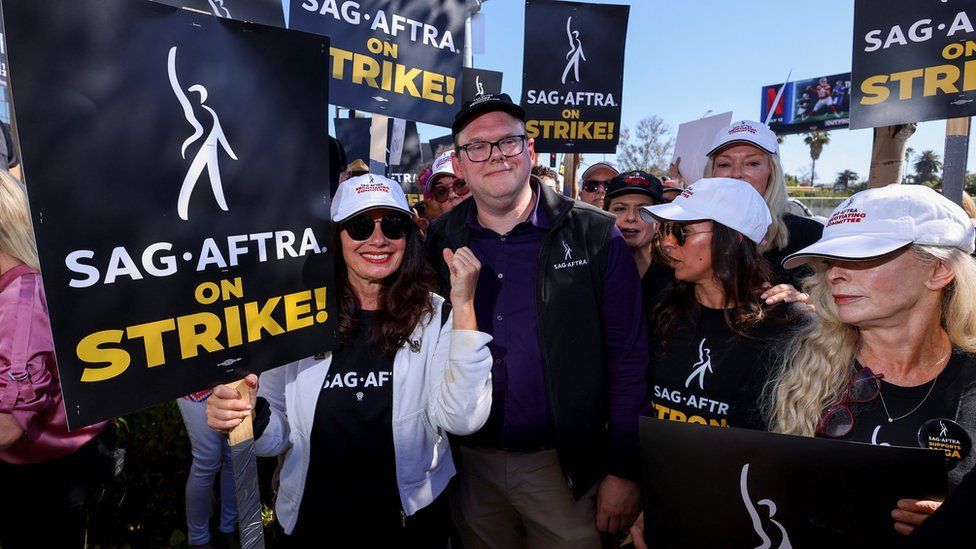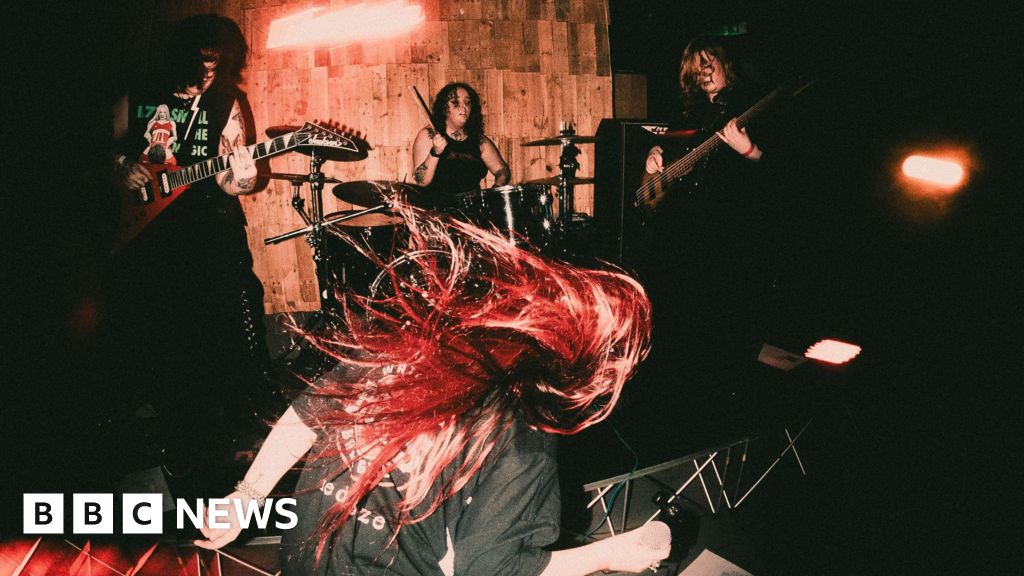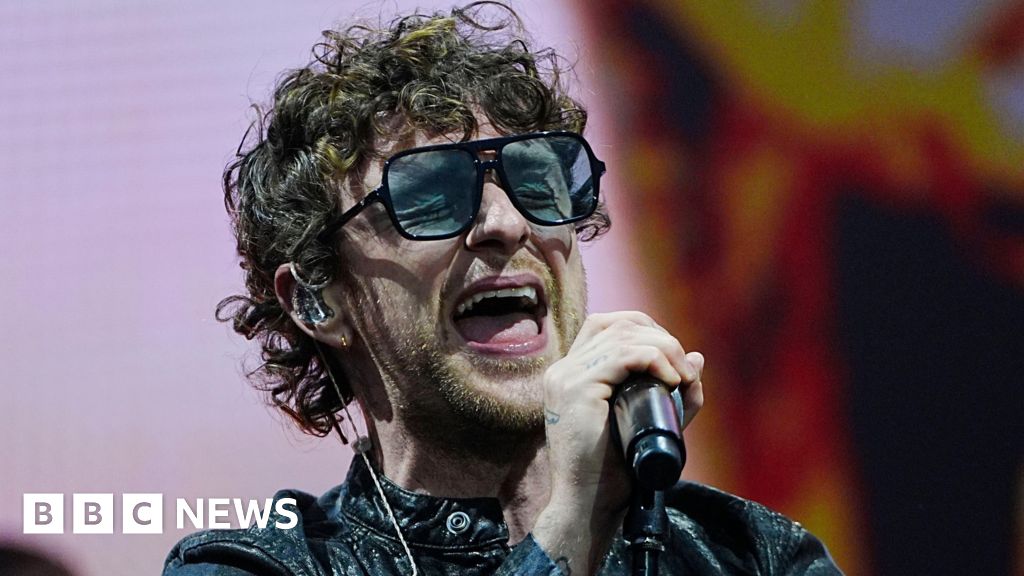ARTICLE AD BOX
 Image source, Reuters
Image source, Reuters
Fran Drescher, SAG-AFTRA president, poses with members of the union's negotiating committee on the first day of the strike
By Chelsea Bailey
BBC News, Washington
Vancouver's Brightlight Pictures studios resemble something of a ghost town these days.
Production on many shows had already been affected after US screenwriters' strike in May. Now with Hollywood actors joining the writers on union picket lines, studios have ground to a halt.
"It feels like COVID when I drive into the lot," said filmmaker Shawn Williamson, who founded Brightlight Pictures Inc. in 2001.
"But in COVID we knew it was ending. In this case, it feels very much beyond our control, which is frustrating."
As more than 160,000 performers in the US stopped work at midnight on Thursday, the ripple effects are being felt in film hubs thousands of kilometres away.
Speaking from his office above the empty studio soundstage, Mr Williamson told the BBC the Canadian film and television industry depends on American writers, actors and studios for much of its work.
Before the strikes began, Brightlight, a leader in Canada's film and television industry, was home to shows like Amazon's Upload, ABC's The Good Doctor, and Firefly Lane on Netflix.
"Typically, we'll be shooting seven, eight or nine shows at this time," he said. "All of these things are now on hold while we wait for the studios and the unions to sort things out."
The dual strikes have halted production on numerous shows, and upended film festivals and red carpets during the height of the summer season.
For the first time in decades, San Diego's Comic-Con may be held without celebrities -- its biggest draw. Meanwhile, the Toronto International Film Festival, which was set to begin in early September, is soldiering ahead in the hopes that talks will resume.
"The impact of this strike on the industry and events like ours cannot be denied," organisers said in a statement to the BBC. "We urge our partners and colleagues to resume an open dialogue."
Image source, Brightlight Studios Inc
Image caption,Shawn Williamson (centre) on set with actor Freddie Highmore (right) and writer David Shore (left) at Brighlight Pictures before strikes began
The strikes have left Canadian actress Kaylah Zander in limbo; unsure of when she will return to the sets for Netflix's The Recruit.
"I had wardrobe fittings and things scheduled that all just sort of disappeared overnight, and we have no idea when we'll be back to shooting."
Though she is not a member of Screen Actors Guild and the American Federation of Television and Radio Artists (SAG-AFTRA), Ms Zander said she supports their strike because SAG contracts help set the industry standard for actors unions around the world.
"They are our best hope really for lasting change. And the way that things are going, it's just not sustainable."
Talks with studio heads collapsed Thursday, as both unions failed to reach a deal to avoid the largest Hollywood shutdown in decades. Both sides remain bitterly divided over issues like work conditions, the future of artificial intelligence, and how studios split profits from streaming giants.
On Thursday, ahead of the strike, Walt Disney CEO Bob Iger told CNBC that the work stoppage has come at "the worst time in the world".
"There's a level of expectation that they have that is just not realistic, and they are adding to a set of challenges that this business is already facing, that is quite frankly, very disruptive," he said.
The comments prompted swift backlash online, spurring actors to post screenshots of their residual pay cheques - many valued at less than a dollar.
Image source, Getty Images
Image caption,Actress Maya Gilbert-Dunbar says the strikes are about more than actors pay cheques
Actress Maya Gilbert-Dunbar, who is running for SAG-AFTRA president, scoffed at the Disney CEO's comments.
"I don't go to the perpetrator for a solution to the problem that they caused," she said.
Ms Dunbar, who is based in Atlanta, said the perception that the strike is so that A-list actors can make more money is false. For her, the strike is about ensuring that thousands of "elder actors", who currently lose access to health insurance at age 65, as well as up-and-coming stars, can continue to have a career in Hollywood.
"Our industry is facing an existential crisis," she said. "The bulk of our membership are career background actors. These people are barely making $150 (£114) a day."
She estimated only 15% of the 160,000 SAG-AFTRA members make the required $26,000 a year to qualify for health insurance coverage.
"That's below poverty," she said. "We have a lot to fight for. And there's a lot on the table."
In the weeks before negotiations between SAG-AFTRA and the Alliance of Motion Picture and Television Producers (AMPTA) collapsed, Ms Zander said representatives approached the actor's union in British Columbia to renegotiate their contract for the next year.
"It has been contentious because there's a huge camp of actors that say absolutely not. Look what they're doing to SAG, they're coming for us next," she said.
Others feel Canadian actors were being asked to help tide the industry over during the ongoing strikes, she added.
Image source, Getty Images
Image caption,Actress Kaylah Zander says she's unsure when she will be able to return to filming
As a producer, filmmaker and member of the Directors Guild, Mr Williamson of Brightlight Pictures said he can see multiple sides in Hollywood's ongoing fight.
"I know that all the union leadership are compassionate - but that compassion doesn't trump the needs of the members."
He said he's cautiously optimistic that both sides will return to negotiating and find a settlement by August. Until then, the studios at Brightlight Pictures will remain quiet.
"We are just collateral damage around what the studio feel they need and what the (actors and writers) union's feel they need."

 1 year ago
41
1 year ago
41








 English (US) ·
English (US) ·